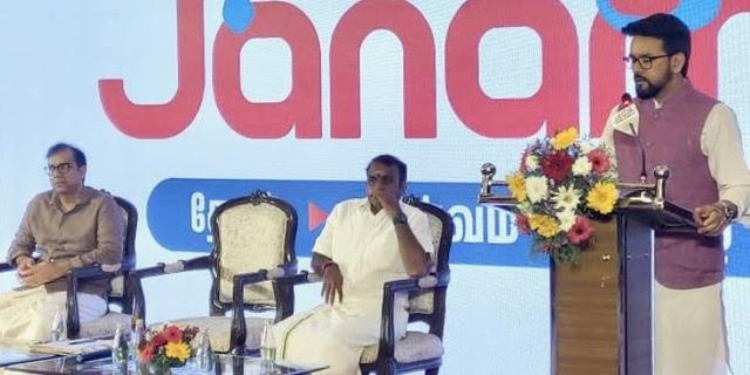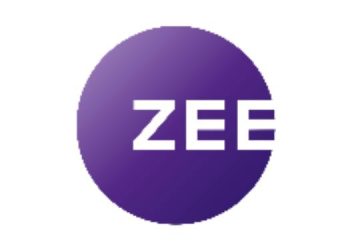“India’s rich tapestry of cultures and languages thrives on the strong regional media,” said Minister of Information and Broadcasting, Anurag Thakur. He was speaking at the launch event of Tamil news channel Janam.
Speaking about the challenges in the media world, he said, “We have seen the challenges that the specific areas are facing, when the political party or ideologies, when they are on Television channels, Networks, Cable TV operations, they limit the news just to themselves and propagate their view point.”
Thakur underlined that, In the world’s largest democracy, the media plays a very important role and it is the fourth pillar of democracy. In a democratic set up it is very important that we should get free and fair news and the content.
“News should cut across various ideologies, as well as policies and programs of state and central governments,” he added.
“India’s rich tapestry of cultures and languages thrives on the strong regional media. Today, we see a lot of sensationalism. Rather than reporting the news, many are in the habit of making and creating the news,” Thakur observed.
According to Thakur, Upholding journalistic integrity and providing balanced and verifiable news is paramount.
“As our nation tries for Ek Bharat, Shreshtha Bharat (One India, Great India) media plays a vital role in promoting unity and celebrating our cultural diversity,” he added.
“India’s media landscape has undergone a dramatic transformation, transitioning from print to private television channels, and now embracing the dynamism of digital and social media. Our government under the leadership of Prime Minister Narendra Modi has actively streamlined the governance process to empower a more robust information ecosystem,” Thakur said.
Thakur further highlighted the revolution of media in the country.
“I still remember in the 90s when the Television media came, it threw a challenge to the Print media. Over a period of time, we could see that reporting for the Print media has also changed and now with the growth of social media in the last 15 years, we could see how new media is drawing a challenge each and every day to the electronic media,” he added.
Challenges of fake news and power of digital media
Thakur said that with the advent of technology, digital and social media brings in a lot of challenges, at the same time more opportunities are also brought in.
“During the pandemic period we have seen the challenges faced by the world and thousands of people lost their lives. One of the reasons for that is fake news rather than pandemic. It is our responsibility not to create news, not to spread fake news. The editors of the print and electronic have a big role to check and verify whether the news is fake or right,” he said.
Thakur noted that it remains a challenge, when it comes to digital media. He said that with each passing day people will become more responsible and will stop spreading fake news.
“If you look at the electronic and print media, they are limited to the cities or rural areas. But with the advent of new media, even an independent journalist sitting in a small village can throw important news on the new media, which also becomes a breaking news or the main news or a headline for the print and the electronic media- that is the power of new medi,” he said.
The minister underlined that while self regulation is crucial, it should not translate to unchecked bias or intentional misinformation. Media must try for objectivity and truth.
“As I said the infodemic of fake news continues to pose a threat, we urge the media houses to be vigilant and self-evaluate their methods to counter the spread of misinformation. The advent of deep fakes and AI can pose a threat with fake news, we should be much more aware as a voter and citizen of what is fake and right,” Thakur said.
Government initiatives to facilitate media operations
Another area of concern, according to Thakur, the paid and fabricated news are equally concerning, especially during the election period.
“The media must collectively combat these menaces to uphold journalistic integrity. Our government acknowledges the challenges faced by the media and is committed to providing support- initiatives like revised uplinking and downlinking regulations, specified press registration process aimed to facilitate media operations,” he said.
Thakur threw some light on the initiatives.
“Until last year, we had the Press and Registration of Books (PRB), an act made by the Britishers in 1867, but under the Modi government, my ministry has come out with the Press and Registration of Periodicals bill. Earlier from the colonial era, the district magistrate had a very important role in providing licenses for the printing press also to come out with periodicals or newspapers- that was a eight steps process. We have cut down this to a simple and simultaneous online process. You have to register online with the district magistrate (DM) and RNI, if the DM doesn’t reply within two months, the RNI will do the title verification and license will be provided.”
“When we came to power in 2014 it was 63,000 compliances burden across various sectors in the states, it was cut down by 40,000 compliances, it is only 23,000 compliances today. It will be further cut down. We have ensured easy access to official information, by making it available in multiple regional languages on the Press Information Bureau (PIB) website. PIB’s fact check service actively debunks fake news to prevent its proliferation (this is related only to the government),” he added.
“As India is all set to become ‘Vikasit Bharat’, the media has to play a critical role, you are the people responsible to keep any government more accountable and, on their toes, that is the power of democracy,” Thakur surmised.

















